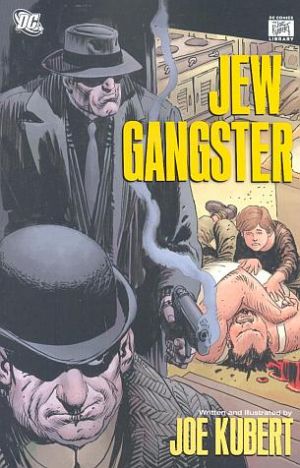- Comics
- Comics Reviews
- Manga
- Comics Reviews
- European Comics
- News
- Comics News
- Press Releases
- Columns
- Spotlight
- Digital Comics
- Webcomics
- Cult Favorite
- Back Issues
- Webcomics
- Movies
- Toys
- Store
- More
- About
By Leroy Douresseaux
May 15, 2011 - 12:49
 |
| Cover image for Jew Gangster - The Joe Kubert Library paperback edition |
Jew Gangster: A Father’s Admonition was a hardcover graphic novel written and drawn by Joe Kubert and published by IBooks in 2005. As part of “The Joe Kubert Library,” DC Comics has republished the gook as Jew Gangster in a paperback edition (with French flaps!).
Jew Gangster is a hybrid, coming-of-age story that is also crime fiction and is set in Depression-era New York City. The story’s protagonist is Reuben “Ruby” Kaplan, a handsome young man growing up in Brooklyn, specifically “the East New York section.” Ruby is from a poor immigrant family (Polish). His father, Isaac, works as a dress cutter, and his mother runs a kosher restaurant (by herself) in the front rooms of the building where the family lives. Ruby also has a younger sister, Rifke.
Ruby is, quite frankly, tired of being poor. He’d been occasionally running errands and making special deliveries for a local mobster named Monk Greenberg. Eager to help support his hardworking parents, Ruby starts skipping school to do more work for Monk. Ruby does make more money, consequently falling deeper into the organized crime world, but also angering his father. Ruby becomes Monk’s right hand man, participating in brutal, terrible criminal acts, but betrayal and suspicion not only put Ruby’s life on the line, but also his family’s lives.
Jew Gangster is similar to the Depression-era, Jewish, and historical melodramas and biographical comics that Will Eisner produced as graphic novels the last 30 years of his career and life. On the surface of Jew Gangster, it may appear that Joe Kubert is employing every gangster cliché and poor immigrant family trope found in popular storytelling, from the heartbroken papa and diplomatic mama to the criminal mentor and martyred pal. One might even compare this graphic novel to one of those cinematically-influenced comic books trying to look like a Film-Noir crime flick.
Jew Gangster, at its heart, is a coming-of-age story depicting two fronts: that of Ruby Kaplan and that of the Jewish people, specifically those in the section of Brooklyn where Ruby lives. Kubert’s story hinges on Kaplan’s realization of what it will take to do more than merely survive, and that could be said to be true of the Jewish community of which Ruby is part. Jew Gangster seems to say that no matter where one lives – at the top, middle or bottom of society – life is a struggle. Ruby, like his Jewish contemporaries, must pick his fights and battles and win them and perhaps, get more out of life, but any kind of victory is not without some kind of cost.
To relegate Jew Gangster to a particular genre is to deny the universal nature of this story about a wayward boy who just talks about taking care of his family and becomes a man who really takes care of his family. His struggle in his chosen profession by which he will care for his loved ones could take place in many other professional setting. When you look past the violence and grimy Brooklyn setting, this could be a biographical tale of boy entering the adult world of comic book publishing. This same story could focus on a boy on the verge of becoming a man as he navigates his way through the complicated, political worlds of government, law enforcement, business, finance, etc.
Yes, Jew Gangster is what it is, dressed in the rags of crime fiction and playing out on the mean streets of Depression-era Jewish Brooklyn. Behind all that, however, is the common tale of a boy in tough times, in a tough neighborhood, making tough choices so that he can make his way in the world. Jew Gangster is a terrific story in that way.
A-